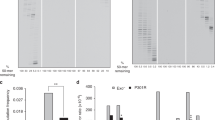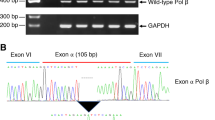Abstract
Tumor development is characterized by accumulation of mutations. Such mutations, if induced by carcinogens in DNA polymerase genes, would confer mutator properties on the DNA replication machinery, even at later stages of development. To investigate whether DNA polymerase δ can be mutated, we compared these enzymes from highly malignant Novikoff hepatoma cells and from regenerating normal rat liver. We sequenced the DNA polymerase δ cDNA from both sources and investigated the physico-chemical properties, inhibition characteristics, and copying fidelity of the purified enzymes. The cDNA sequences examined included the entire reading frame encoding the catalytic subunit (subunit I) of DNA polymerase δ. First-strand cDNAs were prepared from total RNA of both normal rat liver and Novikoff cells by reverse transcription, and the polymerase δ sequences were amplified by the polymerase chain reaction. cDNA (3325 bp) were sequenced. A single heterozygous mutation (CGG → CAG) has been detected in nucleotide position 1948 (codon 648) of the polymerase δ gene from Novikoff cells, resulting in an Arg to Gln change. Position 648 lies just proximal to the conserved region VI, which is part of the “fingers” subdomain of α-like polymerases. This subdomain is involved in dNTP binding. Upon comparison of biochemical characteristics of partially purified DNA polymerase δ from both Novikoff cells and rat liver, the following properties of the enzyme from Novikoff cells were found to be altered: (i) K 50 values for nucleotide analogs (e.g. butylphenyl-dGTP) were lower, (ii) sensitivity to various antineoplastic drugs (e.g. doxorubicin, topotecan and distamycin) was enhanced, (iii) copying fidelity was decreased when primer templates containing O 6-methylguanine were used, and (iv) the activity of DNA polymerase δ from Novikoff tumor cells was less stimulated by lactate dehydrogenase than the enzyme from normal cells. The altered biochemical characteristics of DNA polymerase δ from Novikoff cells suggest mutator properties. We conclude that the point mutation detected in the cDNA might be causally related to the observed changes in inhibition characteristics and copying fidelity.
Similar content being viewed by others
Author information
Authors and Affiliations
Additional information
Received: 12 February 1999 / Accepted: 11 May 1999
Rights and permissions
About this article
Cite this article
Popanda, O., Flohr, T., Fox, G. et al. A mutation detected in DNA polymerase δ cDNA from Novikoff hepatoma cells correlates with abnormal catalytic properties of the enzyme. J Cancer Res Clin Oncol 125, 598–608 (1999). https://doi.org/10.1007/s004320050322
Issue Date:
DOI: https://doi.org/10.1007/s004320050322




